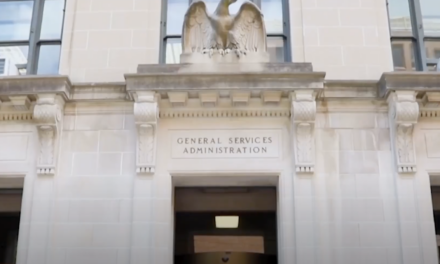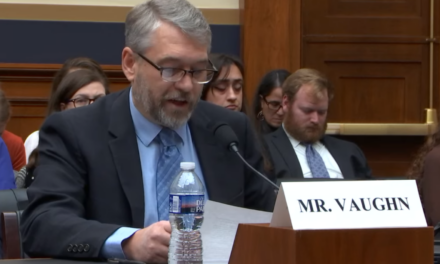We support our Publishers and Content Creators. You can view this story on their website by CLICKING HERE.
CASPER, Wyo. — In full view of Casper Mountain, a half-block of dirt vibrating with giant trucks slopes out from a single office building. Thousands of Christians are helping this dirt turn into Luther Classical College, part of a new generation of college startups founded by Americans whose kids can’t wait for existing institutions to reform.
The blue, gold, and violet palette of America’s mountain west is brighter this autumn day thanks to the cloudless sky. Releasing little puffs as they emerge from frosted vehicles, families trip into the low, brown Mount Hope Lutheran Church and School across the street. They fulfill many an American pastor’s dream amid a post-lockdown attendance deficit by filling two Sunday services with families full of children.
Some little girls wear calico prairie dresses with chic booties. Others wear jeans, hiking shoes, and sweatshirts. Parishioners pass around babies when they get wiggly. In the unusually circular nave, the pastor preaches in front of the organ, itself in front of a large crucifix.
These grownups are building their little ones a college. They want a place their children can meet a faithful spouse and transition to adult duties without contracting debt for a substandard education. They want a robustly Christian classical curricula combined with vocational training — in LCC President Harold Ristau’s words, a place where “a young man can become a plumber while also studying philosophy.”
Plans for Luther Classical College.
While the founders of Luther Classical and Roman Catholic institutions such as the College of Saint Joseph the Worker in Steubenville, Ohio, want a deeply traditional Christian environment, the founders of Ralston College in Savannah, Georgia, and the University of Austin in Texas (UATX) are especially responding to the destruction of open discourse at the top-ranked religion-hostile campuses.
“Not founding institutions of higher education is the exception to the historical norm, not the rule,” says Stephen Blackwood, Ralston’s president, during a Zoom interview. “The norm of humanity is birth and rebirth. That’s how you keep things alive, whether they’re families or fires— they have to be made alive in the next generation to exist at all. We need new things.”
Earlier efforts like these created some robust institutions. Pre-law students at Patrick Henry College, a Christian college founded in 2001, outscore Ivy Leaguers on the LSAT. In 1994, New Saint Andrews College opened with four students in Moscow, Idaho. It now has 220 students and 27 faculty. After opening in 2007 with 35 students, Wyoming Catholic College “has grown 30 percent in the last decade, from 124 to 178 students.” In 1971, Baptist preacher Jerry Falwell started Liberty University. It is now one of the world’s largest Christian universities, with 15,000 students on campus and 80,000 online.
The students choosing these universities want to be “part of a solution because they know something is broken, but the education they received doesn’t allow them to identify what’s broken,” says Wyoming Catholic College President Kyle Washut, who is helping Luther Classical open. “The kind of students we get are the ones who would have signed up for the Pony Express 150 years ago. They want greatness.”
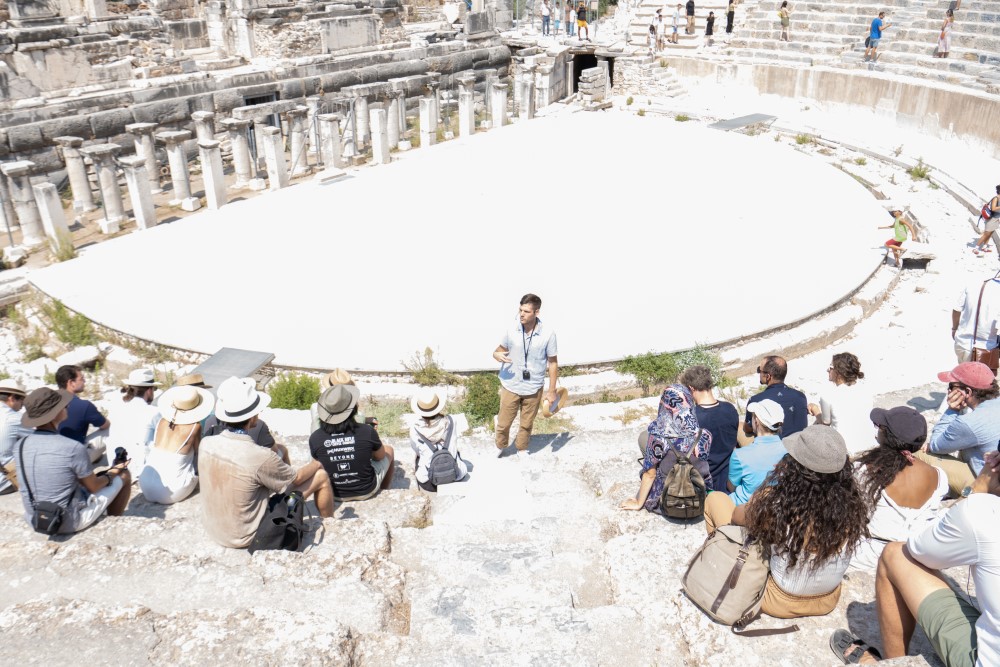
Ralston College students learning Greek in Greece, 2024. Image courtesy Ralston College.
These colleges still in their first five years almost all offer a great books core curriculum, often combined with vocational training. They also include Catholic Polytechnic University outside Los Angeles, the currently 21 local affiliates of the Christian Halls International network, Catholic Institute of Technology in Italy, Harmel Academy in Michigan, Kateri College in New Mexico, Hildegard College in California, Thales College in North Carolina, Rosary College in South Carolina, and Santiago Trade School in California. Elon Musk also reportedly plans to spend $100 million to create a K-12 science-focused school and eventually a related university in Austin, Texas.
The incoming Trump administration is floating plans to end or significantly alter the U.S. Department of Education, which controls college accreditation policies that push race- and sex-based curricula and policies. Without accreditation, colleges cannot accept federal student loans, the top source of tuition inflation. New colleges cannot earn accreditation until they have graduated their first class, requiring them to entirely self-fund for at least their first five years while competing with subsidized institutions.
“School accreditation, teacher certification, flow of public funds, and standardized testing — whoever controls those four, you’re going to control 90 percent of education and shaping the minds of the next generation,” says Classic Learning Test founder Jeremy Tate. CLT is an ACT and SAT competitor that targets the growing classical education market.
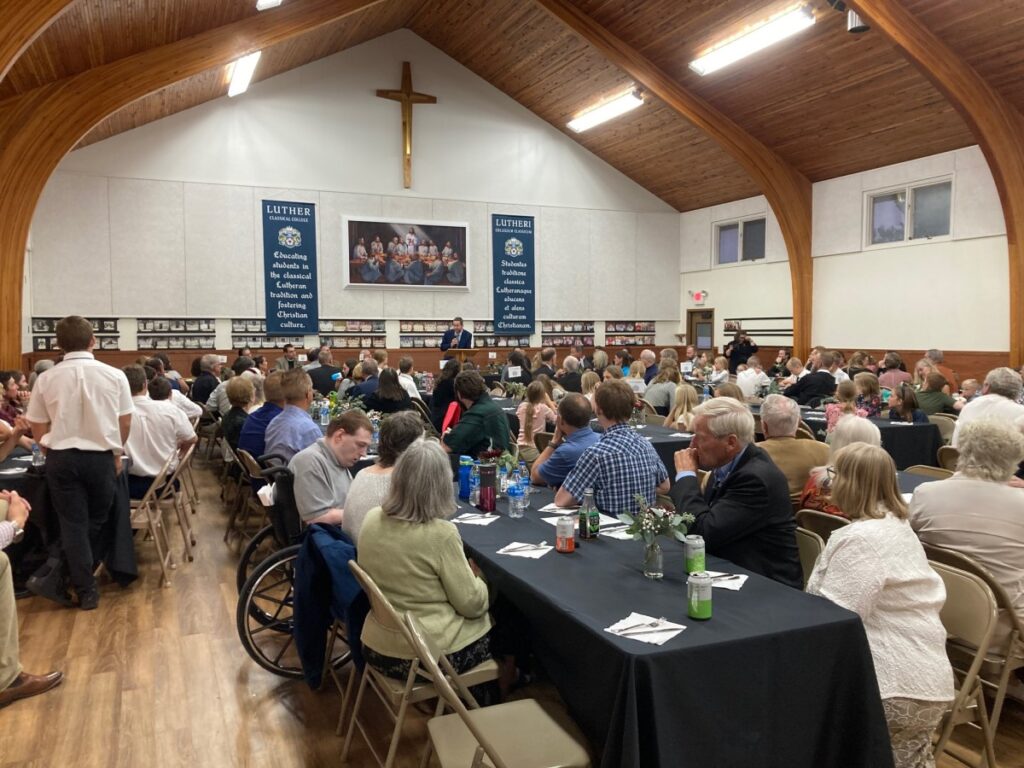
Long-Fetid Education Wasteland
Today’s founders aren’t all working in frontier settings like Wyoming, but all exude the pioneer spirit by tilling a vast wasteland. Between 2015 and 2024, Americans expressing to Gallup a “great deal” or “quite a lot” of confidence in higher education dropped from 57 to 36 percent. Self-described Republicans’ confidence plummeted the most, from 56 percent confidence to 20 percent.
“Americans who lack confidence in higher education today say their concerns lie in colleges pushing political agendas, not teaching relevant skills, and being overly expensive,” Gallup says.
Due to this lack of confidence and below-replacement birth rates, U.S. college enrollment appears to have declined at least 10 percent since its peak in 2011. One economist estimates the baby bust alone will tank enrollment another 15 percent between 2025 and 2029. Enrollment losses close an average of one college per week, the Hechinger Report says: “Nearly 300 colleges and universities offering an associate degree or higher closed between 2008 and 2023.”
Americans are right to distrust higher education. Most students who enter college don’t earn a degree in four years, and only two-thirds get one in six years. Average tuition, room, and board in 2020 cost approximately triple the 1970 cost in inflation-adjusted dollars, and quality has tanked.
Only one-third of Americans correctly answered at least 60 percent of multiple-choice questions from the U.S. Citizenship test in 2018. In 2007, an Intercollegiate Studies Institute survey of 14,000 college students found that at many institutions, particularly Ivies, seniors scored worse on basic civic knowledge than freshmen. Surveys such as from the American Council on Trustees and Alumni (ACTA) continue to find college students ignorant of basic knowledge required to vote responsibly, such as who is on the U.S. Supreme Court, term lengths for elected officials, and why Americans celebrate July 4.
Now professors at “elite” colleges say their SAT-acing students can’t read books. Top-scoring students “have trouble staying focused on even a sonnet,” Georgetown University’s English chairman told The Atlantic. The SAT and ACT college entrance exams have been “renormed” several times since the 1950s, inflating student scores to reflect that U.S. K-12 schooling has also dramatically worsened.
More than half of college graduates work in jobs that don’t require a college degree. Businesses demand useless degrees partly because “overzealous civil rights enforcement by regulators has made it exceedingly difficult for businesses to administer job-related pre-employment tests,” says a November Heritage Foundation report. “… In addition, state regulators require an excessive amount of licensing and credentialing for professions that do not need to be backed by particular degrees.”
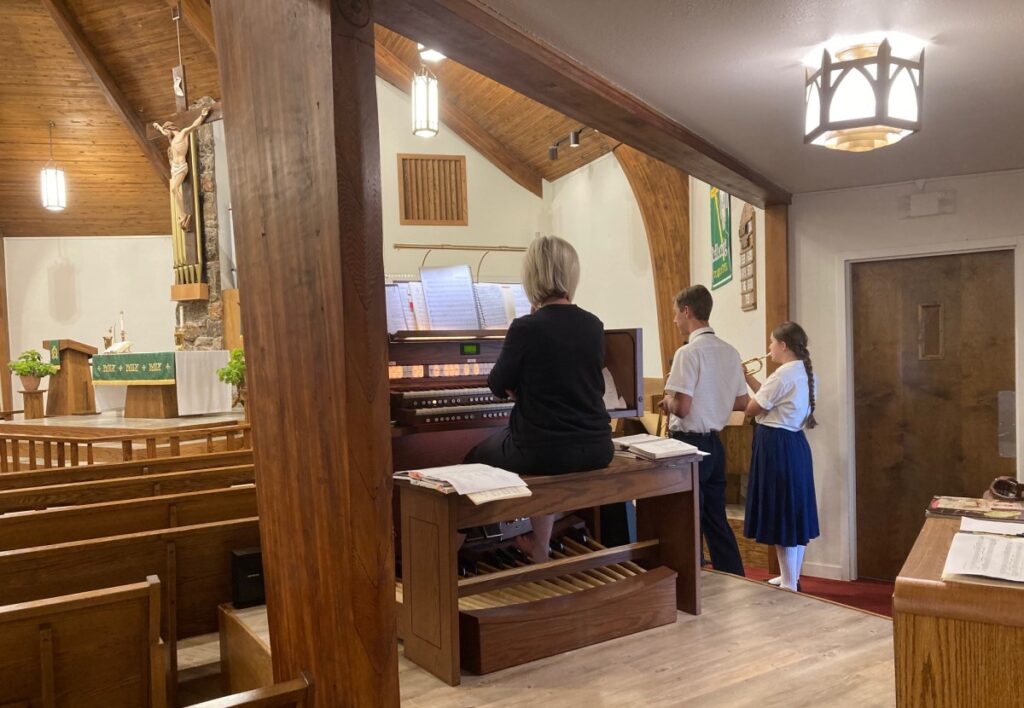
Marcus Ristau, center, practices trumpet music at supporting congregation Trinity Lutheran for his father’s inauguration ceremony in October. Marcus is a member of Luther Classical’s founding class.
Research also confirms that secular schooling erases faith. A 2020 comprehensive research review finds “especially increasingly secularized government control of education significantly drive[s] secularization and can account for virtually the entire increase in secularization around the developed world.” Secularization also accounts for nearly the entire baby bust endangering the U.S. economy, research shows, because religious Americans have population-sustaining numbers of children, but people without faith don’t.
While many students don’t grow intellectually or spiritually in up to six years going into debt for college, their politics do shift. Research shows more years in secular schooling correlates with support for anti-American policies such as erasing private property and constitutionally protected freedoms such as worship, speech, armed self defense, and private association.
When he entered the academic job market in 2020 with two degrees from Yale University and two from Oxford University, Thales College Provost Peter Forrest found just about every academic job demanded cultural Marxist affiliations, he said in a phone interview. Two years into teaching at Thales after a five-year bout at Alabama’s flagship Auburn University, he said, he’s done more discussing about “the biggest and deepest questions … than in the last 10 years in my academic philosophy career.”
Thales is just three years old and currently has 20 students. They graduate in three years, hold paid internships that fast-track them into jobs on graduation, and pay $12,000 a year for tuition. It’s backed by North Carolina businessman Bob Luddy, who earlier started networks of low-cost classical K-12 schools with long wait lists.
Billionaires for Free Speech
ACTA’s most recent survey finds 53 percent of college students support censorship of “hate speech” and the same percentage constantly censor themselves. Even more ominously, a 2023 study found 55 percent of college students agreed with a racist statement by Adolf Hitler that was altered to criticize white people instead of Jews.
It was the opposite atmosphere — of freewheeling conversation about any topic — that attracted freshman Benjamin Solin to the University of Austin’s inaugural class this fall. At UATX, “what is frowned upon is going into a conversation with hostility instead of an open mind,” Solin told The Federalist. “Everyone is willing to have an actual conversation with you about your views, and the goal is to find the truth about a subject by just debating each other.”
Solin says his dad stopped donating to his alma mater, Yale University, because it didn’t protect Jewish students during recent campus protests supporting Hamas, a Palestinian group the U.S. government designated a terrorist organization in 1997. Dozens of billionaires withheld donations to top-ranked campuses after students celebrated the Oct. 7, 2023 Hamas terror attack on Israeli civilians that included kidnapping, rape, and murdering infants. Billionaires Bill Ackman, Marc Rowan, and others successfully pressured the presidents of Columbia University, Harvard University, and the University of Pennsylvania to resign over the issue earlier this year.
UATX President Pano Kanelos, formerly of the great books college St. John’s, told Education Next his institution raised $230 million since 2021 partly thanks to the campus Hamas protests, including from 113 donors who gave “six- to eight-figure gifts.” In October, The Wall Street Journal reported that billionaire donors to UATX include hedge funder John Arnold and his wife, Laura; oil and gas trader Len Blavatnik; real-estate developer Harlan Crow; early backer Joe Lonsdale, a venture capitalist; investor Alex Magaro, who donated $10 million; PayPal cofounder Peter Thiel; and libertarian investor Jeff Yass, who gave the school $35 million.
All this has allowed the fledgling university to offer full rides to their entire 92-person freshman class. Solin said he’s reading something like 50 pages a night for classroom discussions capped at 15 students, “more than I’ve ever read in my life. It’s incredible.” He says students come to class eager to learn and with insights to contribute: “There are people I disagree with, but I love discussing with them. When they’re not in class I feel like I’m missing out because I’m not hearing their point of view.”
Classes currently convene in a former department store in downtown Austin that “60 Minutes” says sits between a Ruth’s Chris Steakhouse and a Velvet Taco. Students live in apartments, not dorms, and cook their own food — there’s no meal plan. UATX will not offer professors tenure. The university told media they received more than 6,000 job applications.
Its first class is two-thirds men, perhaps a consequence of “stand[ing] for color-blind merit over identitarian bias, equality over equity, free speech over censorship, and truth over lies,” as Lonsdale proclaimed in a City Journal article. Polling shows women college students support censorship and identity politics at far higher rates than men.
Left-wing coverage claims the school cofounded by Jewish Free Press editor Bari Weiss and Harvard fellow Niall Ferguson, a man married to a Somali expat with biracial children, seeks racial segregation and has too many students of the “wrong” sex and skin colors. Less ridiculously, however, some attacking UATX tacitly point out free speech isn’t a complete or sufficient solution to deep disagreements over fundamental realities.
In some countries, for example, huge majorities support sharia law. Every community censures some speech — such as advocacy for child abuse or Weiss’s advocacy against Palestinian supporters. And some research finds that exposing people to opposite views can deepen their position rather than moderate it. Free speech is an Enlightenment, classical liberal solution to intra-Christian religious wars that only works if most in society agree on underlying fundamental principles as “self-evident” — such as the reliable existence of objective fact and reason that postmodernists deny.
‘I Couldn’t Wait Four Years’
This summer, John Alznauer got together with other founding-generation UATX students in an Austin Airbnb to make a short film. During lunch one day, Alznauer said, the group comprised of Jews, atheists, Catholics, and evangelicals just happened to discuss what Christians mean by “being saved.” To Alznauer, the ensuing discussion typifies UATX: “the complete openness to open yourself up to criticism and test your ideas with people with different ideological backgrounds. The willingness and freedom to do that is incredible.”
While his parents are academics, Alznauer said in high school he didn’t see himself as being happy in college, even though he planned to give it a try. He skipped his senior year of high school to go straight to UATX and says it’s the only college he applied to.
College “seemed like this period of time that wouldn’t help me much in the real world, just check a box on someone else’s list of what I needed to do,” the young Chicagoan with shoulder-length blonde hair said in a video interview. All he ever wanted to do, Alznauer said, was start businesses. He’s already started several, primarily in monetizing social media platforms for creators: “I wanted to build, and I couldn’t wait four years.”
He and Solin described reading Plato, the biblical books of Genesis and Job, The Odyssey, and other magisterial Western works during their core studies, which largely occupy their first two years. In the last two years at UATX, students can focus on one of four specializations while completing their Polaris Project. That’s a four-year project “that can advance the human condition in some way,” said Mike Shires, an economics professor and chief of staff at UATX.
Both the open discourse focus and the entrepreneurial capstone project are part of the university’s goal of encouraging students to take personal, social, and professional risks, Shires said: “We want them to take chances, we want them to find dead ends. We want them to say, ‘Hey this seems like a good idea,’ and to find out it’s not.” That’s how people grow, says Shires, who has been a professor for 23 years.
Pastors Who Hunt Antelope and Feed the Blind
Donovan McConnell is another young entrepreneur who exhibits perhaps quieter virtues. His older brother, Dennis McConnell Jr., is blind and autistic, and has cerebral palsy and epilepsy.
A homeschool graduate who works in his father’s videography business, Donovan makes it possible for his parents to go out together sometimes, because Dennis Jr. requires around-the-clock care. Donovan can lift his wheelchair-confined adult brother and contributes mightily to the household every day, Dennis McConnell Sr. said in a phone interview from their home in Nebraska.
“I’ve actually had people in the past that indicated [Dennis Jr.] shouldn’t be allowed to live because he doesn’t offer anything to society,” Dennis Sr. said. “I actually think he does. He brings out compassion in people. Donovan is the responsible young man he is today because of Dennis Jr.”
Previously, the McConnells weren’t sure if Donovan would go to college. Dennis Sr. explained: “I went into heavy college debt, and it didn’t really help me a whole lot.” But Donovan wants to become a pastor in the 2 million-member Lutheran Church-Missouri Synod, which requires eight years of higher education. Donovan considered another Lutheran college, but withdrew after “red flags,” such as pronouns in the admissions counselor’s email signature, Black Lives Matter support on campus, and finding the majority of students don’t support the school’s faith.
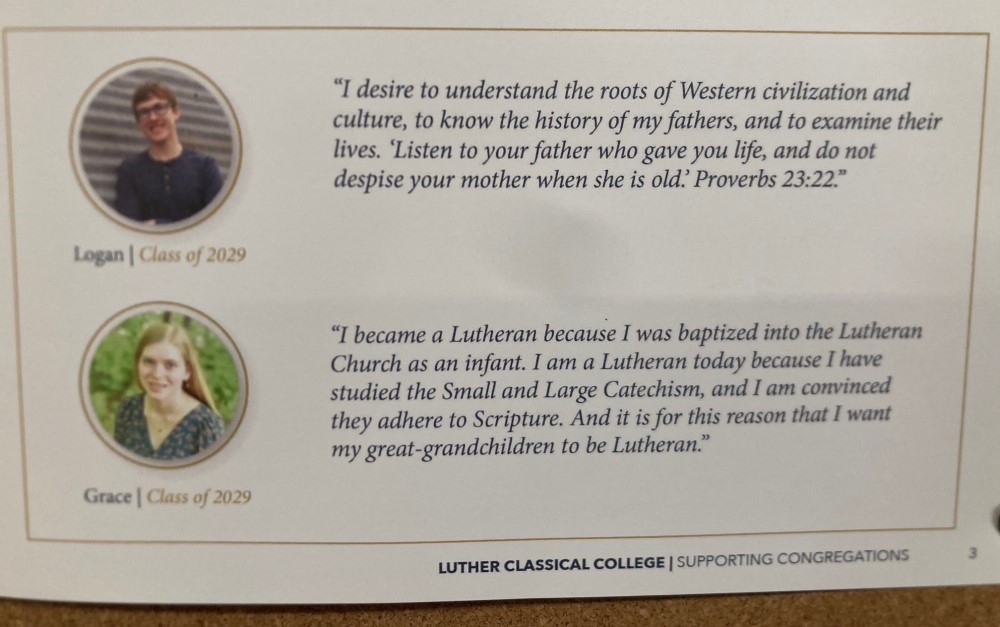
Members of Luther Classical’s founding class explain why they chose the school in a college brochure.
The McConnells hope to move to Wyoming with Donovan, who has enrolled in Luther Classical’s founding class of fall 2025. But it’s complicated. They can’t transfer Dennis Jr.’s Medicaid and Social Security disability without establishing residency, which they can’t do until they sell their home. Because Dennis Sr. is self-employed, getting a mortgage is harder. And homes cost twice as much in Casper.
They’re strongly motivated, however, by the livestreamed prep classes Donovan is already taking that Dennis Sr. loves to eavesdrop on and their visits to Casper. Welcoming church-goers have already invited the McConnells out to hunt antelope so plentiful they stalk picnic-goers at Casper parks.

The view from a trail on Casper Mountain, which overlooks the town.
Shifting Public Institutions
The growing appetite for non-ideological instruction in great books, rigorous sciences, and accurate history is shifting public universities already. In 2023, Gov. Ron DeSantis installed a new board of regents at New College of Florida to transform its curriculum in that direction.
“The biggest threat to our country is [that] our educational system has failed for 60 or 70 years, engaged in this indoctrination to the point that people don’t believe in a free market, people believe socialistic countries should be the future for America,” New College of Florida President Richard Corcoran told The Federalist’s Matt Kittle last week (MINUTE 28:00).
Currently, 19 colleges and universities, seven of them public, offer core curricula recognized by the American Council of Trustees and Alumni as “hidden gems” amid a higher education landscape in which even history majors can graduate without ever studying American history. The few students who do take an American history or Shakespeare class often find them full of anti-Western, critical theory nihilism.
Last year, the National Association of Scholars released model legislation that would establish a great books core inside state universities to attract the top students who often become civic leaders in need of a cross-disciplinary education. Several state legislatures, likely including Utah and Texas, will consider the legislation in January.
“The greatest challenge we faced early on was belief that it could be done—not that it should be done but the confidence that it could be done,” Blackwood said. “That is a sign of a defeated culture that no longer believes in itself. If it needs to be done, we need to try to do it.”

 Conservative
Conservative  Search
Search Trending
Trending Current News
Current News 